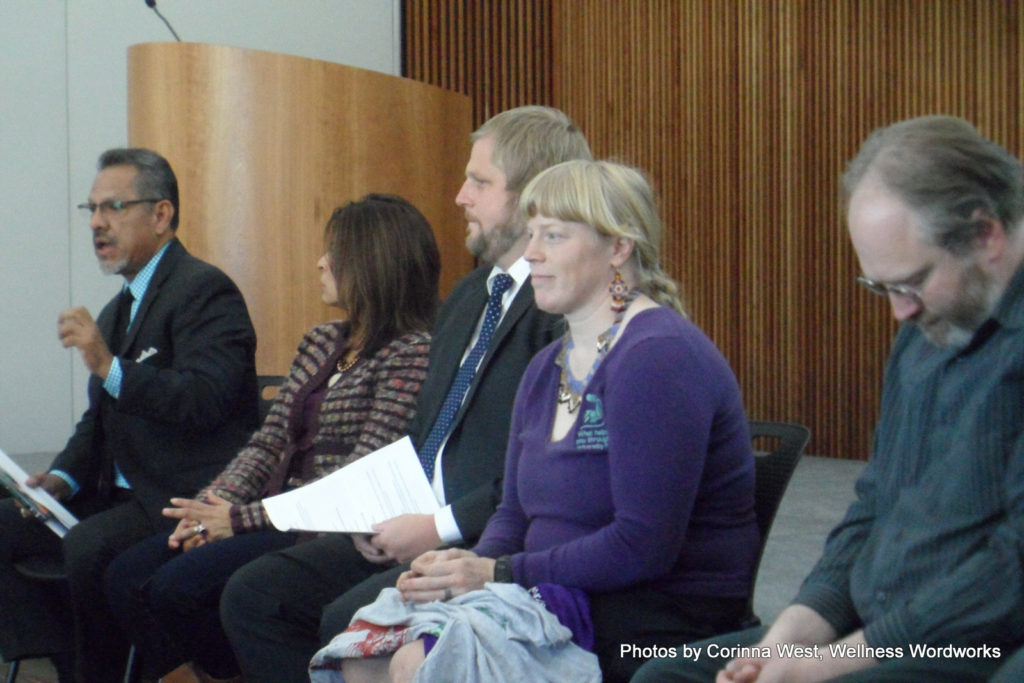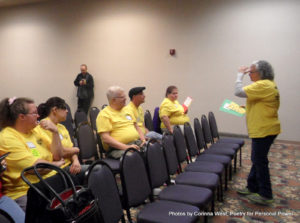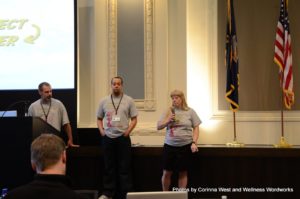Do you know what Provider Privilege is? It’s what’s blocking progress in behavioral healthcare. Americans are learning that many if not most chronic health issues have a “behavioral health” component. And we say “behavioral health” in air quotes because it’s not our behavior, it’s just that sometimes emotional distress is a normal reaction to an abnormal situation. And yet provider privilege is blocking the advocates who have solutions from joining the discussion.
Discourse around these issues is often driven by advocates drawn from providers of clinical services. Provider privilege means our community can’t come to the table. Often, the only people who get a voice are the ones making money off doing things the way they have always been done. Let me say this again. Clinicians, social workers, and their surrogates speak for service users and they dominate discourse in public health forums. This is dehumanizing, discriminatory, and insulting. No other distinct social group or human population tolerates this dismissive behavior, though many of them are powerless to change it.

Nothing about us without us
Currently, most of the policy change coalitions related to behavioral health are dominated by people who emphasize disease and disability, and who focus mainly on patient recruitment, insurance reimbursements, and grant funding for clinical work. Very few “consumers” can afford to attend the daytime meetings where these decisions are made. Most people come to these meetings because they know it will help their agency get funded, whereas “consumers” have to pay for their transportation, childcare, and have to take time off work. The recovery movement is working to get poverty, racism, personal recovery, social supports, and quality of life issues to be discussed within these coalitions, but we are working uphill. The recovery movement priorities ARE social determinants of health. They are not just about keeping our agencies alive.
The recovery movement represents users of these services — people who know when clinical services typically work, and when they often don’t. Our constituency knows what recovery means, what it takes to rescue people from a life stuck on drugs, and what consequences people experience when they are trapped in cycles of dependency fostered by service systems that need major repairs. The recovery movement (or whatever we need to call our community) seeks to foster transformational change around these issues. We advocate for AND implement a research-driven program model that embodies the reforms that are needed to produce better mental health outcomes in our society.
And yet, foundations are still funding mental health providers and the mental health lobby to talk about behavioral health. The Colorado Trust has a health equity cohort where the only behavioral health voice is a mental health “provider privilege” agency. The National Council For Behavioral Healthcare only has one recovery movement voice in their Health Equity cohort of 20 “provider privilege” agencies. The Colorado Health Foundation designed a whole 3-day conference on behavioral health without talking to ANY of the four largest behavioral health advocacy organizations in the state. Recovery movement voices are still not present in most discussions of healthcare. SAMHSA removed the requirement that the CCBHC “provider privilege” grants had to have an advisory board with 50% peer representation. What part of “Nothing About Us Without Us” do people not understand? And why is this important?
The Exemplary Advocate Cohort
This recently started bubbling to light when the Missouri Foundation for Health decided they were going to pick 15 organizations to fund as “Exemplary Advocates” at $100,000 a year for the next five years. That means the foundation has an inner circle and every other advocacy organization in the state gets second fiddle or excluded for the next five years. And the 15 organizations work together on a lot of intersectional topics that our community badly needs. Often, recovery movement advocates have WAY more in common with other social justice advocates than we do with various disease model “provider privilege” advocates. And we’ve already seen two of these cohorts projects turn against us, so this time we knew we had to be the lead applicant or not go in at all.

Well, MFFH had 47 organizations apply for the 15 slots and then they picked some of them for a final interview. And I contacted the five advocacy organizations in Missouri: NAMI, MHA, and the three statewide recovery/consumer networks. These are Missouri Recovery Network, my organization, Poetry for Personal Power (which works in three states including Missouri), and the NAMI “consumer” network. And NONE of the advocacy organizations were in. So I sent out an urgent email to the behavioral health community and said, “All of the advocates got rejected or didn’t apply, so either they are picking one of the providers or our community is not represented.”
And I heard back from the mental health center lobby: “Well, WE are in the finals.” You know the mental health center provider privilege lobby, right? There is one is every state. An agency dedicated to begging for money for the Community Mental Health Centers (CMHCs). My gut reaction to that was a jaw-dropping dismay — such a perpetration of injustice, such a great loss to our community. If you had the same reaction, please help out and email Nicole Brueggeman, Ryan Barker, Thomas McAuliffe at MFFH and tell them why. I’ll ask again later because this is really important.
The CMHC provider privilege lobby is even worse than having disease model advocates represent us, and here’s why. The disease model advocates don’t know the difference between medical help and medical harm. So they promote all kinds of weird solutions that don’t work. But at least the disease model advocates are focused on “consumer” outcomes, and at least they are focused on multiple solutions. Whereas the CMHC lobby is only focused on one solution: CMHCs. And they are not focused on “consumer” outcomes, though they will talk about it sometimes. Their job is to keep the mental health centers alive.

And this is a hard job these days. The mental health centers are all starving. Constant budget cuts at a time when health care costs are rising. But in doing their job, many of them have blocked peers from Medicaid billing, blocked us from CCBHC participation (or at least not bothered to support it), blocked us from any of the SAMHSA block grant funds, minimized our participation in the State Targeted response grants (in Missouri, four recovery community centers out of $10 million, really?), and in general not supported peer recovery supports financially. Not all of these are intentional decisions, but most of them have not actively fought any of this. Because it’s not their job, right? They don’t understand recovery, most of them. It’s not the standard paradigm. What percent of Americans know what the recovery movement is or why we are important? And remember, our people can’t come to all the decision-making meetings where all the providers are at to meet these people. Because those meetings are in the daytime and providers are being PAID to be there whereas consumers have to spend their own money to attend, and take time off work.
Provider Privilege and blocking progress
So what this boils down to is institutional or structural discrimination. Why don’t recovery movement organizations have equal access to the federal funding streams? These CMHCs benefit immensely from “provider privilege” and I am calling it out. This is a systemic problem. Here we are, where most recovery movement organizations would love to have just 5% of the CMHC money in the state to expand peer recovery supports. And 5% of the the CMHC money would expand recovery supports 500-fold. We have actually been asking for the 5% for a long time but they haven’t heard it yet. Really HEARD it. And giving us 5% would probably save the CMHCs at least 20% of their costs, which at least matters in a value-based world.
But our recovery movement world is kind of like Cuba or South Africa, we’ve been blockaded so long, we built all our own industries. This happened in the US during segregation, too. At The Negro Leagues Museum in KC, a quote from Satchel Paige talked about how some black businesses failed after integration because their patrons could now shop at white stores. A lot of the peer-run business models are really weak and have been propped up for so long and they will fail when they have to compete. But a lot of them are amazing, and once the mental health centers dare to allow competition, and we get a chance to compete fairly, what comes out will be amazing.

The CMHC lobby has unfortunately blocked progress in our industry for a long time, probably unintentionally for the most part. It’s time to stop blocking progress and give peer-run organizations the same access to Medicaid billing, CCBHC contracts, the Medicaid Admin funds, the SAMHSA block grants, HMO contracts, HMO billing, all of it. All of the funding streams used by CMHCs. Give us access without forcing us to jump through any more hoops than they have to. Just let us play on a level playing field, same access to all that money, same requirements, same reporting systems. Or even just try for once to give us access to the meetings where this stuff is decided. Don’t force us to use 30-year-old business models like Missouri Department of Mental Health does and then say, “your drop-in centers haven’t changed for 30 years.”
Open up the competition, and then see what kind of amazing developments occur. Missouri would have such an amazing influx of recovery movement leaders and businesses, recovery rates would skyrocket, it would become a national model. Just for once, try calling out the “provider privilege” and making some progress on equal access to funding.
Look at some of the outcomes from CalMHSA and their Proposition 63 that taxed millionaires but said the money HAD to be spent on recovery. That law funded all kinds of neat things and California is really changing quite a bit because of it. It’s probably only 5% of the overall funding in California, but it has had all kinds of system-level effects.
Why this is imperative
The CMHCs are struggling with viability because they are an obsolete business model. 70% of people are getting psych drugs from primary care docs now, and fully integrated models are more effective. Colorado just removed their carve-out for behavioral health providers and fully integrated them. Direct or cash pay primary care is expanding rapidly, and so can cash pay behavioral health. Other business models are needed. Young people aren’t sick for life anymore and don’t want to hang out with the older institutionalized people. Rural people can’t even have their car seen at the mental health center parking lot or they are branded forever. Lay interventions are needed. Other ways of describing emotional distress and trauma are needed, and other ways to support people in their community. I’m presenting at a conference on lay interventions next week in Colorado.
It’s just basically not viable to use a disease entity to describe a social level problem, then put people on drugs that don’t beat placebo, then try to reduce discrimination by telling people to “be nice to the mentally ill.” People aren’t signing up for that model anymore, or not staying with it, and the ones who got dragged into it a long time ago aren’t getting better. And yet no one knows what else to do when they break down, and people are breaking down more and more because society is getting harder and harder to live in.
What if the 26 CMHCs in Missouri could advertise based on recovery rates and outcomes like the cancer units and birthing units do? That’s where hospitals make money. Inpatient opioid treatment is a huge revenue stream, but it doesn’t work, and people are going to catch on pretty soon and demand alternatives or yank that funding back.

Peers can help the CMHCs get ahead of the curve and start CMHCs moving from 5% recovery rates to 80%. Everyone working in the mental health system knows it’s broken, but no one knows what to do instead. How do you help when someone has a freakout? And how do you make it sustainable? We don’t really know either, we are struggling to find a viable business model ourselves, but provider privilege has made our struggle immensely harder. Provider privilege has forced us to be 300% better before we can even play. By forcing us to prove we are effective without any money. By forcing us to sell nothing but an idea and then saying we don’t have data to back up our ideas. And recovery movement programs are still small, most of them. But that’s because we haven’t had any access to money — entrepreneur funders don’t like mental health clients as customers, the provider lobby is blocking provider types of funding streams, and advocacy funding is becoming more and more centered around health equity but excluding our community from the discussion. Which will be the topic of my next blog post.
How to Take Action On This:
But for now, you can do ONE THING to make a difference. You can email the people at the Missouri Foundation for Health and tell them you have had enough of provider privilege. There is no reason they should give more money to the people who have had all the money all along and can’t solve the problems. The mental health center lobby group mainly just begs for money for mental health centers. That’s their job. It’s NOT their job to promote the community SURVEYED needs for prevention, trauma-informed care, or youth development.
MFFH rejected all three consumer networks in the state plus MHA and NAMI, and all five of those organizations are MUCH more likely to speak for the needs of consumers. Furthermore, this MFFH selection process has been a secret process with no stakeholder engagement, and the behavioral health community in Missouri has been given no opportunity to choose their own representative or voice.

When funders aren’t supporting a community’s needs, what can we do about this situation? You can take back your power from these funders. We do this by reaching out and asking them nicely to change the situation. The behavioral health community needs to choose our own voice, state our own problems, and choose our own solutions, not just spend the next five years begging money for the mental health centers. The funder said they cared about adaptive solutions that challenge paradigms so this is what they need to fund.
So spend three minutes today and email Nicole Brueggeman, Ryan Barker, and Thomas McAuliffe at MFFH, tell them you are sick of “provider privilege” and tell them why. Tell them Missouri could have such a flourishing of innovation, opportunity, and recovery, if only advocates were given a fair chance to shine.
You can also join our Recovery Movement Health Equity Discussion Group to discuss these issues and more.















What’s Blocking Progress in Behavioural Healthcare?
Denial of the Human Condition, in my humble opinion. You frame your word formulation from the so-called Recovery Movement Perspective, without writing a word about what our sense of recovery is From or To.
It’s not fair the way we recovery experts, by way of Experience are Excluded from the Funding Table & We want our share of the Tax Payer Pie, seems to be your Emphasis Here.
Yet, Corrina, is this truly the role of this community in an era when technology is threatening to produce a society where only 60 percent of people will have a job that pays enough to allow more than simply paying for the necessities of survival.
Are you barking up the wrong tree with this highly rationalistic sense of recovery? Should you perhaps go back to Scripture & ask Yourself why Jesus teaches in Parables and whether you can embrace a felt-sense of how The Father & l are One?
What is coming around the Existential Corner, so to speak, is not how the experience of so-called Mental Illnesses is a Pathological Disease, but what the experience has to teach that multi-headed Dragon we label Normal, about The Human Condition.
He quotes the Prophet when asked why he teaches in Parables; they seeing see not and in no wise perceive.
And the in principle question is, do you take this wisdom passage literally, as history, or figuratively as metaphoric of the paradox of human motivation and perception.
And more importantly for behavioural healthcare, can you take it seriously by changing the word they to “l.”
“I am Corrina West,” you might say to yourself and meditate upon ‘how’ you effectively think, l am these words.
Good luck on your existential journey.
Report comment
She is on a business journey.
Report comment
i like what you are doing…I also like people getting together
helping each other without money being involved…
Report comment
I don’t think anyone can change the core of what mental health, inc. is all about. Szasz writes that coercive or involuntary “acts of psychiatry” should be banned outright, declared illegal. I’ll go a couple steps further and argue that -all- “acts of psychiatry,” and “acts of psychotherapy,” too, should be banned. The whole industry is based on lies…not to mention force, fraud, and coercion. This industry cannot be reformed. Personally, I think the best any of us can do is to walk away and warn the others. What else is there to do, really?
Report comment
“Personally, I think the best any of us can do is to walk away and warn the others. What else is there to do, really?”
Yes indeed. The level of bullshit deception, hypocrisy, expoitation and profit is really difficult for people outside of all this to even begin to grasp. Was just reading the comments on this:
https://www.dailymail.co.uk/news/article-6222831/Third-mystery-death-linked-celebrity-mental-health-clinic-year.html
These people have no concept of toxic psychosis/akathisia induced by drugs and from withdrawal.
Then we have the rest of the parasites fuelled and incentivised by the incurable ‘mental illness’ business model. Websites like this which knowingly provoke us survivors who have insight through experience and feel compelled to tell the truth about ‘peer’ support workers, psychiatrists and psychologists. This is why oldhead is correct – we need a platform for ourseleves, alone… no parasites.
Report comment
This past Tuesday, I attended a meeting at the local hospital. The Commissioner of the N.H. Dept. of Health and Human Services was there, with a couple staff folks. In Feb., 2016, the hospital fired their child psychiatrist, which resulted in shutting down their 6-bed “Adolescent Psych Unit”. A couple months later, 30 more staff were terminated, and they shut down their 12-bed “Adult Psych Unit”. Now, there is NO inpatient “psychiatric care”/”mental health unit” in a small city hospital which had that for decades. So at this meeting, the Director of the local “Peer Support Agency” stated that “hospitals refuse to accept our workers”. I spoke up, in a loud voice, and said, “The State should NOT ALLOW the hospitals to deny peer support workers.” I even repeated that exact statement into the polite & stunned silence which followed my first comment. As has been documented elsewhere here on MiA, the “mental health system” either refuses, or co-opts “peer support staff”. That’s further proof that psychiatry is a pseudoscience, a drugs racket, and a means of social control. IF it was a legitimate medical specialty, it would WELCOME assistance from any person. The exclusion and co-opting of peer workers is further proof of the toxicity of the so-called “behavioral health/mental health” system…..
Report comment
I went into the NH State Hospital in Concord one time with Ken Braiterman. He led a WRAP group but it was more just patient advocacy consulting work. He told people about medical harm and coming off meds. The group I sat in, I remember him saying, “You need to tell the staff you will agree with anything they want, that’s the only way out of here. Once you get out you can work a different plan.”
I asked him if the staff ever minded him discussion controversial (read factual) information. He said, “No, they have never tried to censor my group.”
The local CMHC gave him an award, here’s his essay on that, one of the last things he wrote before getting sick with ALS. http://wellnesswordworks.com/riverbend-mental-health-center/
Report comment
Comment removed for moderation.
Report comment
The single biggest obstacle to “progress” in “behavioral healthcare” is the delusional belief that such a FRANKENSTEIN as “behavioral healthcare” actually exists outside of fiction….
In the 1800’s, we had Frankenstein, Dracula, Vampires and werewolves.
In 2018, we have the X-Men, Transformers, Superman, Batman, and Wonder Woman.
Makes sense.
After all, we’re still practicing 19th Century medicine with the pseudoscience drug racket of psychiatry….
Report comment
“Behavioral Health” is an even more Orwellian term than “mental health,” if that’s possible. Anything that blocks its “progress” can only be a good thing.
Report comment
I am glad you said that. I find “behavioral health” particularly disturbing. Now behavior has “health???”
Report comment